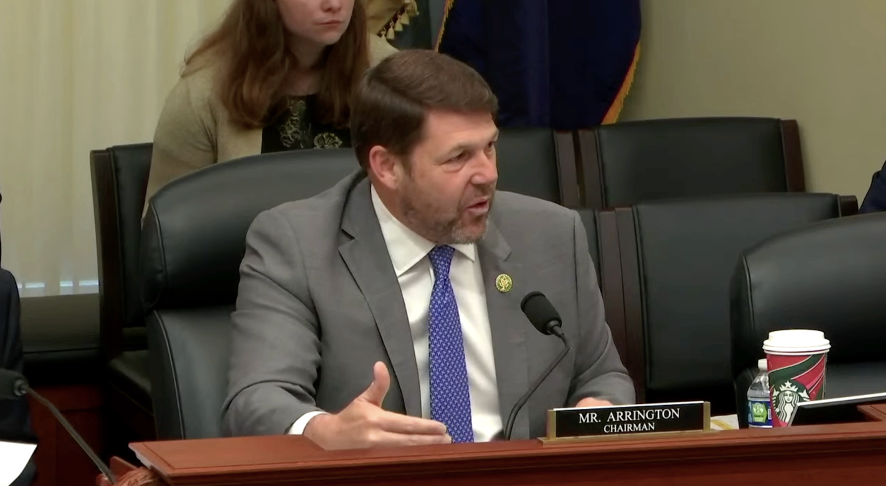Chairman Arrington Delivers Opening Statement at Member Day Hearing on Budget Process Reform
WASHINGTON, D.C. - Today, House Budget Committee Chairman Jodey Arrington (R-TX) delivered the following opening remarks at the Committee’s Member Day Hearing on budget process reform:

Click HERE to watch the Chairman's statement as delivered
Chairman Arrington’s remarks as prepared for delivery:
“I want to thank the audience for coming.
It's a sign of strength and tremendous support for this budget reform process, which is part and parcel to restoring fiscal responsibility in our nation's capital.
To me, that is the overarching goal for all of this: to rein in the deficit spending that's driving the unsustainable national debt, to reverse the curse that James Madison talked about—a public debt is a public curse, and the worst of its kind, he said, in a republican form of government.
We have to reverse the curse, but we can't do that with the current culture and the current process.
People are more important than process, and ultimately, as Tom McClintock has articulated, the people of this institution have to have the political will to do the necessary and now extremely painful things, politically and otherwise, to right this ship and put our nation on sound financial footing.
But process matters, and if you have a broken process, you will get bad outcomes most of the time. Process is nothing more, in my mind, than a set of incentives, and incentives drive behavior.
What we need is to encourage members to conduct themselves in a responsible way when it comes to this process, so that we can get the right and responsible outcomes for the taxpayers.
Fifty years ago this week, the Budget Committee passed what would become the Congressional Budget and Impoundment Control Act of 1974.
For the first 25 years, it worked. Budgets were passed on time, there were joint resolutions signed by the President, and things were rocking along. The last 25 years, I would argue, it almost never worked. In fact, here is a list of grievances—and, by the way, these are bipartisan grievances. No party, when they had power and control of either chamber, has lived up to the responsibility of administering the process as it was intended.
We rarely pass budgets. When we do, we almost never do it on time.
Too often, we waive spending caps and sequestration, pay-fors, and other offset measures. And when we do, we often use gimmicky pay-fors that aren't real, and quite frankly, some of the gimmicks we use would land our citizens in the private sector in prison on account of accounting fraud.
Half the time we don't reauthorize programs before we appropriate money to them—not exactly a best practice in responsible budgeting.
Reconciliation, which is a tool to reconcile the gap between revenues and spending—that gap today is $2 trillion. One year, more than all of discretionary spending. In 10 years, according to CBO, it will be double that.
We will accumulate $20 trillion in 10 years, half of which is interest payments alone.
Well, reconciliation was a tool by which this committee and Congress could close that gap. Well, guess what?
Congress has used reconciliation a number of times—when Republicans had total control when I got here as a freshman, and then recently when Democrats had total control—both of them used reconciliation to jam partisan bills through that only made the deficit worse.
So they didn't use it for its intended purposes, but for its self-serving purpose.
We hyper focus on 30 percent of the budget, discretionary spending, and we rarely give even 10 percent of our time to the 70 percent of the budget that is on auto spend. We call it mandatory spending.
That spending, maybe it's 70 percent of the budget today, it's 90 percent of the growth over 10 years.
Okay. I think, as some of my folks back in West Texas would say, it ain't working.
So, let's figure out how we can put those incentives in place. And let's get to a point where the American people can have confidence that we are running the people's house, and the people's business, the way they run their businesses, their families, their local and state governments. It's just that simple.
I want to thank Rudy Yakym, he's a rising star, a new member of Congress from Indiana’s second district.
He’s put a lot of thought into this—the first time I met him on the floor of the United States House, he informed me of his intention to do something about this broken budgeting process, and about our spending problem, and the national debt that is being driven by that spending problem. And we were able to recruit him to the Budget Committee.
I've asked him to be the Task Force Chair on the Republican side to lead the efforts to reform this process, and to work with members and other committees of jurisdiction and across the aisle to identify the best ideas so that we can bring a package to our respective caucuses and, hopefully, we can pass it out of both chambers and take a 50 year old process that isn’t working and make it work better again for the American people, the people we serve.
I would say there's low approval and low confidence, the bar has been set low, sadly, for the American people—I want to prove to them that we can rise to their expectations and be responsible stewards.
So Rudy, thank you for your willingness to lead the efforts on our side. And I'm grateful for you and for the many members who will come today to present their ideas.”


